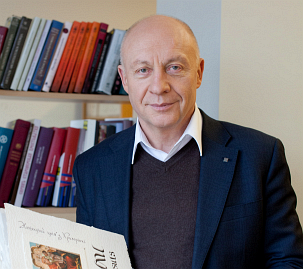

Interview with Director General of the Martynas Mažvydas National Library of Lithuania in the run-up to the IFLA Conference
On 19–25 August, the 83rd Conference of the International Federation of Library Associations and Institutions (IFLA) will take place in Wroclaw, Poland. In the run-up to this event of global significance, the Martynas Mažvydas National Library of Lithuania will host the IFLA Satellite Meeting, inviting the specialists from around the world to attend solid presentations and training. Speakers from Hong Kong, Japan, Uganda, Norway, Latvia, Lithuania, Romania, Nigeria and Brazil will participate in the sessions. According to Mr. Gudauskas, Director General of the National Library, our National Library, being the humanistic centre of international and intercultural dialogue, is the perfect place for hosting prestigious international forums and participating in them in a meaningful way. We offer a brief interview with the head of the National Library Prof. Dr. Gudauskas.

The main theme of the 83rd IFLA Conference in Wroclaw is Libraries. Solidarity. Society. How is this theme relevant to the modern world? Why should it be discussed now? Does Lithuania lack in solidarity?
Only a society which is united in terms of values can foster human values. It is the solidarity in dealing with the general problems of mankind that is lacking in the modern world, which is facing never-ending economic, political, military and social crises – those are essentially the crises of values. This is why the results are disappointing. Of course, everyone has the right to interpret the issue in their own way. And I exercise this right. Lithuania is a country, where the topic of civil solidarity is especially relevant in this historical period. Occasional campaigns will not solve the problems starting with politics and ending with culture. Modern libraries, which are meaningful in terms of values, are not part of the problem, but part of the solution. This is what the Martynas Mažvydas National Library of Lithuania is striving to be – a modern national-level memory institution, a space and foundation of democracy, tolerance, solidarity and public spirit.
The theme of the IFLA Satellite Meeting, which will be held on 16–17 August in Vilnius, is the Challenge of Multiple Identities. Multiethnicity in Genealogy, Local History and Regional Memory – Challenges and Opportunities for Libraries and other Memory Institutions. The Conference will take place in the National Library. Why were we given this right and privilege? How advanced is Lithuania in this field?
The theme is indeed very important in these times of changing local and global identities. As I have mentioned before, the Martynas Mažvydas National Library of Lithuania is a national memory institution, which is directly linked to preservation and nurturing of national and statehood identity. Our international achievements are well-known in the world. For six years we have been the leaders of Bibliotheca Baltica, association of libraries of the Baltic Sea Region. For four years we have been representing Lithuania in the Council of the UNESCO Information for All Programme We hold a number of other significant national and international positions in culture, education, science and other fields. We are particularly known for successful international projects, such as Libraries for Innovation, etc. Our specialists are experts in many international organizations. Extensive and intensive professional relations, international partnership, excellent institutional reputation and new models of activity make us a great venue for prestigious international events.
Speaking in sports terminology, IFLA is like the NBA in basketball. On which league do you think the Lithuanian libraries, other memory institutions and the community itself are playing? Are we equal partners in assessing and taking on the challenges of the modern world?
I can only speak for the institution under my leadership. We are well-recognized and appreciated among national libraries both at the European and global level. The strategy and model of activity of the National Library are considered to be best matching the spirit of the times and the principles of an open, democratic society. We strive to achieve harmony of the classical and the modern. Generally speaking, we are successful in doing this. Over the next few days I will participate in the first World Humanities Conference: Challenges and Possibilities for a Planet in Transition in Liege, Belgium. In addition to a number of previously agreed strategic presentations, I was also asked to present the Martynas Mažvydas National Library of Lithuania as humanistic centre of international and intercultural dialogue to a thousand of delegates from around the world. We are interesting, important and have something to say to the world.
Thank you for the interview!
More information about the session is available here ›



